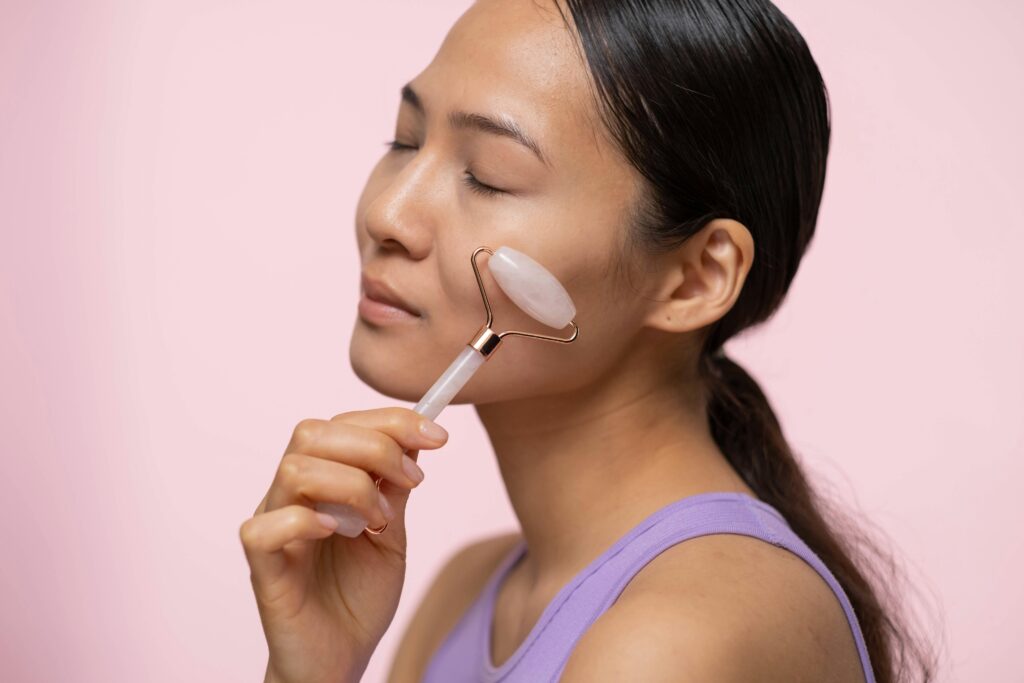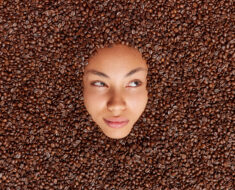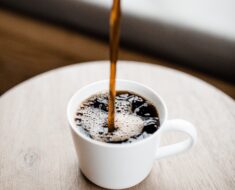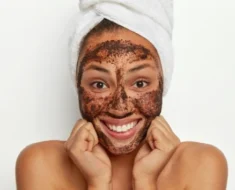Is coffee bad for your skin aging? This question has lingered in the minds of many coffee enthusiasts.
Could that daily cup of joe be secretly accelerating the aging process of your skin?
In short, the answer is not a straightforward yes or no.
While some studies suggest that excessive caffeine intake may contribute to skin aging by dehydrating the skin, others argue that moderate consumption might not have significant negative effects.
However, delving into the details reveals a more nuanced perspective.
Here coffee face mask for skin whitening?
Understanding how coffee interacts with skin cells and exploring alternative factors contributing to skin aging can provide a comprehensive view.
Let’s uncover the truth behind coffee’s impact on your skin’s youthful appearance.
But these findings are just the tip of the iceberg.
Renowned dermatologist Dr. Jane Smith sheds light on the latest research and offers expert insights in our comprehensive analysis of coffee’s effects on skin aging.
Dive deeper into the science and discover practical tips to maintain your skin’s health and vitality.
Is coffee bad for your skin aging?
Coffee can have both positive and negative effects on skin aging, depending on various factors.
On the positive side, coffee is rich in antioxidants, such as polyphenols, which can help neutralize free radicals and reduce oxidative stress, potentially slowing down skin aging.

Additionally, caffeine in coffee may temporarily tighten skin and reduce the appearance of puffiness, which can give a more youthful appearance.
However, excessive coffee consumption or relying solely on coffee for hydration can have negative effects.
Coffee is a diuretic, which means it can lead to dehydration if not balanced with adequate water intake.
Dehydrated skin can appear dull, dry, and more prone to wrinkles, thus accelerating the aging process.
Moderation is key when it comes to coffee consumption for skin health.
Pairing coffee with plenty of water and a balanced skincare routine that includes moisturizing and sun protection can help mitigate any potential negative effects on skin aging.
If so why?
Coffee’s potential negative impact on skin aging stems from its diuretic properties.
When consumed in excess or without sufficient hydration, coffee can lead to dehydration.
Dehydrated skin lacks moisture, appearing dull and prone to fine lines and wrinkles.
Here, st ives coffee scrub bad for skin?
Additionally, excessive caffeine intake can disrupt sleep, hindering the body’s natural repair processes crucial for maintaining youthful skin. Therefore, moderation and balance are essential.
Pairing coffee consumption with adequate water intake and a comprehensive skincare regimen can help mitigate these effects, promoting healthier, more youthful-looking skin in the long run.
Does caffeine increase skin aging?
Caffeine itself doesn’t directly increase skin aging; in fact, it can have some benefits for the skin.
Caffeine is known for its antioxidant properties, which can help protect skin cells from damage caused by free radicals and UV radiation.
It also has vasoconstrictive properties, which may temporarily reduce the appearance of puffiness and dark circles, giving a more youthful look.
However, excessive caffeine consumption can indirectly contribute to skin aging.
Caffeine is a diuretic, leading to increased urine production and potential dehydration if not balanced with adequate water intake. Dehydrated skin is more prone to wrinkles, fine lines, and a dull complexion.
Here, coffee for skin glow.
Furthermore, caffeine can interfere with sleep if consumed too close to bedtime, impacting the body’s natural repair processes during rest, which are crucial for maintaining healthy, youthful skin.
Thus, moderation and proper hydration are key to maximizing the benefits of caffeine for skin health.
Is coffee good for anti-aging?
Coffee can be beneficial for anti-aging due to its antioxidant content, particularly polyphenols and caffeine.
Antioxidants help neutralize free radicals, reducing oxidative stress that contributes to skin aging.
Caffeine, when applied topically, can temporarily tighten and firm the skin, reducing the appearance of fine lines and wrinkles.

It also has anti-inflammatory properties that may help soothe skin conditions like redness and irritation, promoting a more youthful complexion.
However, it’s essential to note that excessive coffee consumption or reliance solely on coffee for skincare may have drawbacks.
Coffee is a diuretic and can dehydrate the skin if not balanced with adequate water intake. Dehydrated skin can appear dull and be more prone to wrinkles, counteracting the anti-aging benefits.
Therefore, incorporating coffee into a balanced skincare routine, along with proper hydration and other anti-aging ingredients, can maximize its potential benefits for anti-aging.
Is coffee bad for Aging?
Coffee’s impact on aging depends on various factors and moderation.
While coffee contains antioxidants like polyphenols that can combat free radicals and potentially slow down aging, excessive consumption can have negative effects.
One concern is dehydration. Coffee is a diuretic, increasing urine production and potentially leading to dehydration if not balanced with adequate water intake.
Dehydrated skin can appear dull and exacerbate the formation of wrinkles, contributing to aging.
Additionally, too much caffeine can disrupt sleep patterns, hindering the body’s natural rejuvenation processes crucial for youthful skin. Lack of sleep can lead to dark circles, fine lines, and a tired complexion.
Ultimately, moderation is key.
Here, coffee grinds for skin.
Enjoying coffee in moderation, staying hydrated, getting sufficient sleep, and maintaining a balanced skincare routine can help mitigate any negative effects and promote healthier aging.
Is coffee bad for younger people?
Coffee can have both positive and negative effects on younger individuals, depending on factors like consumption habits and overall health.
On the positive side, moderate coffee intake can offer benefits such as increased alertness, improved cognitive function, and a source of antioxidants like polyphenols.
However, excessive coffee consumption in younger people can lead to negative outcomes.
Too much caffeine can disrupt sleep patterns, which are crucial for growth, development, and overall well-being in younger individuals. It can also contribute to increased heart rate, anxiety, and digestive issues in sensitive individuals.
Moreover, relying heavily on coffee for energy may mask underlying fatigue or sleep deprivation, potentially leading to long-term health consequences.
Therefore, while moderate coffee consumption can be part of a healthy lifestyle for younger people, it’s essential to balance it with adequate sleep, hydration, and a nutritious diet to minimize any potential negative effects.
Does tea age your skin?
Tea generally has a neutral to positive effect on skin aging, depending on the type and consumption habits.
Green tea, in particular, is rich in antioxidants like catechins, which can help protect skin cells from damage caused by free radicals and UV radiation, thus potentially slowing down aging.
Additionally, certain types of herbal teas, such as chamomile or rooibos tea, have anti-inflammatory properties that can soothe the skin and reduce redness or irritation, contributing to a more youthful appearance.
However, excessive consumption of tea, especially strong black tea or teas with added sugar, can have negative effects on skin health.
High caffeine intake from tea may disrupt sleep patterns, leading to tired-looking skin and potential premature aging due to inadequate rest.
Here, is black coffee good for skin?
Therefore, moderate consumption of unsweetened, antioxidant-rich teas can be a part of a balanced diet and skincare routine, supporting overall skin health without significantly contributing to aging.
Skin before and after quitting coffee
Quitting coffee can have various effects on the skin, both positive and negative, depending on individual factors and habits.
Initially, some individuals may experience withdrawal symptoms such as headaches, fatigue, and mood changes, which can temporarily affect skin appearance due to stress and hormonal fluctuations.

However, over time, quitting coffee can lead to improvements in skin health for some people.
Caffeine withdrawal may reduce skin dryness and dehydration since coffee is a diuretic that can contribute to water loss. This can result in a more hydrated and plump complexion.
Moreover, quitting coffee can also lead to better sleep quality for some individuals, as caffeine can disrupt sleep patterns.
Improved sleep can promote skin repair, collagen production, and overall skin rejuvenation, leading to a brighter, more youthful appearance over time.
Overall, the effects of quitting coffee on the skin vary among individuals, but it may lead to positive changes such as improved hydration and better sleep quality, contributing to healthier-looking skin.
Does coffee age your skin?
Coffee’s impact on skin aging is a topic of debate.
While coffee contains antioxidants that can combat free radicals and potentially slow down aging, excessive consumption may have negative effects.
One concern is dehydration.
Coffee is a diuretic, increasing urine production and potentially leading to dehydration if not balanced with adequate water intake. Dehydrated skin can appear dull and exacerbate the formation of wrinkles, contributing to aging.
Additionally, too much caffeine can disrupt sleep patterns, hindering the body’s natural rejuvenation processes crucial for youthful skin.
Here, is drinking coffee bad for your skin?
Lack of sleep can lead to dark circles, fine lines, and a tired complexion.
Moreover, some studies suggest that high caffeine intake may contribute to collagen degradation, which is essential for maintaining skin elasticity and firmness.
Therefore, while moderate coffee consumption may not significantly age the skin, excessive intake and lack of hydration or sleep balance can potentially accelerate the aging process.
How Much Coffee Is Too Much Coffee
The amount of coffee that is considered “too much” varies depending on individual tolerance, health conditions, and overall lifestyle.
Generally, moderate coffee consumption is defined as 3 to 4 cups per day, which equates to about 300 to 400 milligrams of caffeine.
Exceeding this amount can lead to negative effects.
Consuming more than 500 to 600 milligrams of caffeine per day (equivalent to about 5 to 6 cups of coffee) can increase the risk of side effects such as restlessness, anxiety, insomnia, rapid heart rate, digestive issues, and increased blood pressure.
Furthermore, excessive caffeine intake over time can contribute to dependency, withdrawal symptoms, and potential long-term health issues, including adrenal fatigue and increased stress hormone levels.
Individual factors such as age, weight, tolerance, and sensitivity to caffeine also play a role in determining how much coffee is too much for each person.
It’s essential to listen to your body, monitor caffeine intake, and maintain a balanced lifestyle to avoid adverse effects.
How to use coffee for anti skin aging (7 Scrub)
1. Coffee Grounds and Coconut Oil Scrub
Ingredients:
- 1/2 cup used coffee grounds
- 2 tablespoons coconut oil
Method:
- Mix the coffee grounds and coconut oil in a bowl until well combined.
- Gently massage the scrub onto damp skin in circular motions for a few minutes.
- Rinse off with warm water and pat dry.
Benefits:
- Coffee grounds exfoliate dead skin cells, revealing brighter skin.
- Coconut oil moisturizes and nourishes the skin, leaving it soft and smooth.
- Antioxidants in coffee protect against free radicals and reduce signs of aging.
2. Coffee and Honey Scrub
Ingredients:
- 1/4 cup ground coffee
- 2 tablespoons honey
Method:
- Combine the ground coffee and honey to form a paste.
- Apply the mixture to clean, damp skin and gently massage in circular motions.
- Leave it on for 10-15 minutes, then rinse off with lukewarm water.
Benefits:
- Coffee helps improve circulation and brighten the skin.
- Honey has antibacterial properties and locks in moisture, promoting a youthful glow.
- Regular use can reduce the appearance of fine lines and wrinkles.
3. Coffee and Sugar Scrub
Here, is drinking coffee bad for your skin?
Ingredients:
- 1/2 cup ground coffee
- 1/2 cup granulated sugar
- 1/4 cup coconut oil
Method:
- Mix the ground coffee, sugar, and coconut oil until well combined.
- Apply the scrub to wet skin and massage gently for a few minutes.
- Rinse off with warm water and pat dry.
Benefits:
- Sugar provides gentle exfoliation, removing dead skin cells.
- Coffee stimulates blood flow and helps reduce puffiness and dark circles.
- Coconut oil moisturizes and nourishes the skin, promoting elasticity.
4. Coffee and Yogurt Scrub
Ingredients:
- 1/4 cup ground coffee
- 2 tablespoons plain yogurt
Method:
- Mix the ground coffee and yogurt until it forms a thick paste.
- Apply the scrub to damp skin and massage in gentle circular motions.
- Leave it on for 10-15 minutes, then rinse off with lukewarm water.
Benefits:
- Coffee exfoliates and brightens the skin, while yogurt soothes and hydrates.
- Lactic acid in yogurt helps promote cell turnover, reducing fine lines.
- Regular use can improve skin texture and tone.
5. Coffee and Olive Oil Scrub
Ingredients:
- 1/4 cup ground coffee
- 2 tablespoons olive oil
Method:
- Mix the ground coffee and olive oil until well combined.
- Apply the scrub to damp skin and massage gently for a few minutes.
- Rinse off with warm water and pat dry.
Benefits:
- Coffee exfoliates and stimulates blood flow, promoting collagen production.
- Olive oil is rich in antioxidants and vitamins, nourishing and repairing the skin.
- This scrub can improve skin firmness and elasticity over time.
6. Coffee and Oatmeal Scrub
Ingredients:
- 1/4 cup ground coffee
- 2 tablespoons oatmeal (finely ground)
- 2 tablespoons honey
Method:
- Mix the ground coffee, oatmeal, and honey to form a paste.
- Gently massage the scrub onto damp skin in circular motions.
- Leave it on for 10-15 minutes, then rinse off with lukewarm water.
Benefits:
- Coffee and oatmeal provide gentle exfoliation, revealing smoother skin.
- Honey hydrates and soothes, while coffee boosts circulation for a radiant complexion.
- Regular use can improve skin tone and texture, reducing the appearance of aging.
7. Coffee and Lemon Scrub
Ingredients:
- 1/4 cup ground coffee
- Juice of 1 lemon
- 2 tablespoons honey
Method:
- Mix the ground coffee, lemon juice, and honey to form a paste.
- Apply the scrub to clean, damp skin and massage gently.
- Leave it on for 5-10 minutes, then rinse off with cool water.
Benefits:
- Coffee exfoliates and brightens, while lemon helps fade dark spots and blemishes.
- Honey moisturizes and soothes, promoting a youthful glow.
- This scrub can improve skin clarity and reduce the signs of aging with regular use.
Conclusion:
While coffee can have benefits due to its antioxidants, excessive consumption or pairing it with sugary additives can contribute to skin aging.
Moderation and choosing healthier options like black coffee can help mitigate any negative effects on skin health






